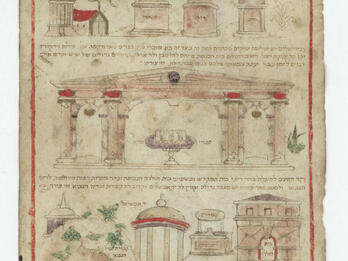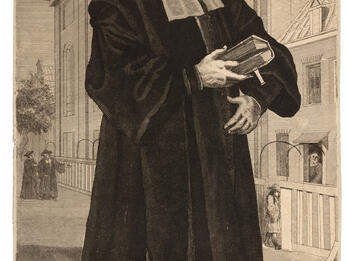Re’shit ḥokhmah (Beginning of Wisdom): On the Synagogue
Furthermore, with regard to a synagogue, one should be careful when leaving the synagogue not to leave with one’s back to the altar, where the Torah scroll is placed. Rather, one should face the holy ark. The same applies when stepping down from the platform where the Torah scroll is situated. This is derived from the sons of Kohath, for they acted in this manner when they bore the ark, as the Midrash describes:
Also in another aspect they were elevated above all the other Levites. For when the latter carried the entire Tabernacle, they would walk along their way, while facing that direction. By contrast, the sons of Kohath would walk backward, with their faces to the ark, so as not to turn their back to the ark. You learn from this that although they were greater than the other families [of Levites], and needless to say [greater] than the Israelites, they were not arrogant, but rather they were devoted to the ark. Why is this? Because there is no greatness before the Lord [Numbers Rabbah 5:8].
Another law that pertains to the honor of the synagogue is that one should not spit there, if it is possible for one to avoid it. If it is impossible, because he is habituated to it, he should spit in a modest way beneath his clothing and scrape it with his feet. On the Sabbath, he should cover it with his feet but not scrape, unless the floor is paved. The best option is to have a special garment for wiping one’s spittle, so as not to release the spittle into the air of the synagogue. One will thereby avoid reckoning, as they said, “If someone spits before his fellow, and disgusts him” [b. Ḥagigah 5a], he is punished, as explained in the Talmud, and as cited above. This is the manner of kings, that none of their ministers is permitted to spit in their courts, even more so in their palaces. The general principle regarding the awe of God is: “Let your fear of heaven be greater than your fear of flesh and blood” [b. Berakhot 28b].
In addition, regarding the honor due to a synagogue, one should not raise one’s voice inside it to call to anyone and the like, because it is the way of those sitting in the house of a king that one does not raise one’s voice before him, but rather speaks in hushed tones. Thus, the Ramban [Naḥmanides (ca. 1194–1270)] wrote in his testament to his son: he should behave modestly and never raise his voice, except in Torah and prayer, because the whole earth is full of His glory (Isaiah 6:3). This one of the practices of modesty, and it is always proper to observe it; especially when one is in the house of the King, the King of the world, where His Presence resides, it is proper to conduct oneself in this modest manner. One thereby demonstrates one’s awe of the Divine Presence and fulfills the commandment of and you shall fear My altar (Leviticus 19:30). The reason that one is obligated in the awe of the Temple and holy places, is that one should be in awe of any place that contains sanctity, as explained above. In this context, it is stated in connection to the patriarch Jacob: And he was afraid, and said, “How dreadful is this place! This is none other but the house of God, and this is the gate of heaven” (Genesis 28:17), or as Onkelos [author of the Aramaic Targum (translation) of the Pentateuch] translates, “This is no ordinary place, etc.” For it is the manner of those who sit before the King that His awe should be upon them. And even though His glory fills the world, out of His love for us, may He be blessed, He has concentrated His presence among us. This is similar to how He concentrated His presence between the curtains of the Ark and the Holy of Holies. Indeed, we find that it is written after the Tabernacle was finished: And Moses was not able to enter into the Temple of Meeting, because the cloud rested upon it, and the glory of the Lord filled the Tabernacle (Exodus 40:35). It is similarly written regarding the Temple, after Solomon had brought the holy ark into the Holy of Holies: The priests could not stand to minister because of the cloud: for the glory of the Lord filled the house of the Lord (1 Kings 8:11). Likewise, a synagogue is full of the light of the glory of God, etc., and even though we see do not see evidence of this, we must believe it with complete faith.
Credits
Elijah de Vidas, "Re’shit ḥokhmah (Beginning of Wisdom)" (Manuscript, Safed, 1579; first published: Venice, 1600). Republished as: Elijah de Vidas, Sefer reshit ḥokhmah ha-shalem, ed. Ḥayim Yosef Valdman (Jerusalem,1984), 315–321 (?).
Published in: The Posen Library of Jewish Culture and Civilization, vol. 5.





